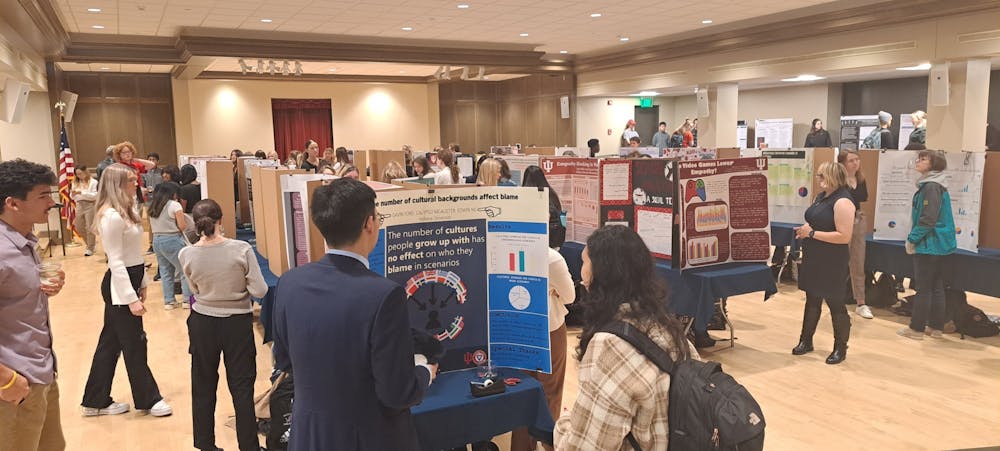After a semester of taking the “Literature and Science of Empathy” class, IU students showcased their original research experiments on various aspects of empathy on Tuesday, Dec. 6 at the Frangipani Room in the Indiana Memorial Union. The final project for the course was for students to come up with their own research experiments, run them, and present them to the public at a poster show organized by ASURE.
Students took a closer look at the role empathy plays in our daily lives and were given six weeks to focus on methods to run their experiments, such as sending out surveys and interviewing students outside of class. Once they received feedback, they could analyze their data.
People researched whether masks affect emotional cognition, how fiction affects empathic concern and determining how empathetic people are depending on whether they have pets or not. Other projects included how video games affect empathy levels and what role racism plays in our ability to empathize.
Fritz Breithaupt, IU professor of Germanic studies and affiliated professor of Cognitive Science, said his first-year students gained valuable experience doing research early on in their lives. Even though someone can never be fully prepared for their first time doing research, his students learned how to deal with both excitement and mistakes. However unfamiliar and hard it may be at first, one can still learn a lot of valuable lessons.
[RELATED: "University researchers in Indiana receive $5.1M grant to help study and prevent overdose deaths"]
Breithaupt said it is uncommon to see undergraduates take on the responsibility of running their own experiments early on.
“It’s even more rare that they are the drivers of this (the research) from beginning to end,” he said.
He said he hopes people will look back on their first time doing research, however imperfect it may be, and reflect on the things that went wrong and how they can improve upon them in the future. It is hard to run a full experiment and interpret the results in a way that is easy to communicate so early on in their college career. Nevertheless, he said he was extremely happy with the quality of work and effort put into these projects.
“(Students had) courage to ask these questions...even talk about controversial issues to try to shine a light on these kinds of things,” Breithaupt said.
He said that empathy is a skill one can learn, improve, and adjust at any stage in life. He described it as a muscle that one can train and develop with time. In fact, empathy plays a prominent role in many aspects of life such as identity and politics.
Paul Gutjahr, associate dean for Arts and Humanities and Undergraduate Education said he started this program because he wanted to expand IU’s research program and promote research not just in the sciences but in arts and humanities as well. This would encourage undergraduates to become more aware and excited about attending a R1 (Research One) institution.
“I want you to give students a transformational experience,” he said. “I want them to come out of your class thinking, I will never look at that thing the same again.”
[RELATED: "IU and Purdue researchers develop nanochip technology to treat traumatic muscle loss"]
IU freshman Anna Schlueter said taking this course has helped her understand her friends as well as her future potential clients better in her career. She learned how to deal with the challenges research presents and how to address those issues in future research endeavors.
“It was very helpful in the sense that we got the experience of learning about something that applies to any course of our life,” she said.
IU freshman Lily Kaufman said she found this research experience an extremely valuable skill that can be applied to any science. She said she enjoyed the topics discussed in class and appreciated the perspective it gave her on the world.
“Now that I’ve done my first project, I know I can improve and do better next time,” Kaufman said.






